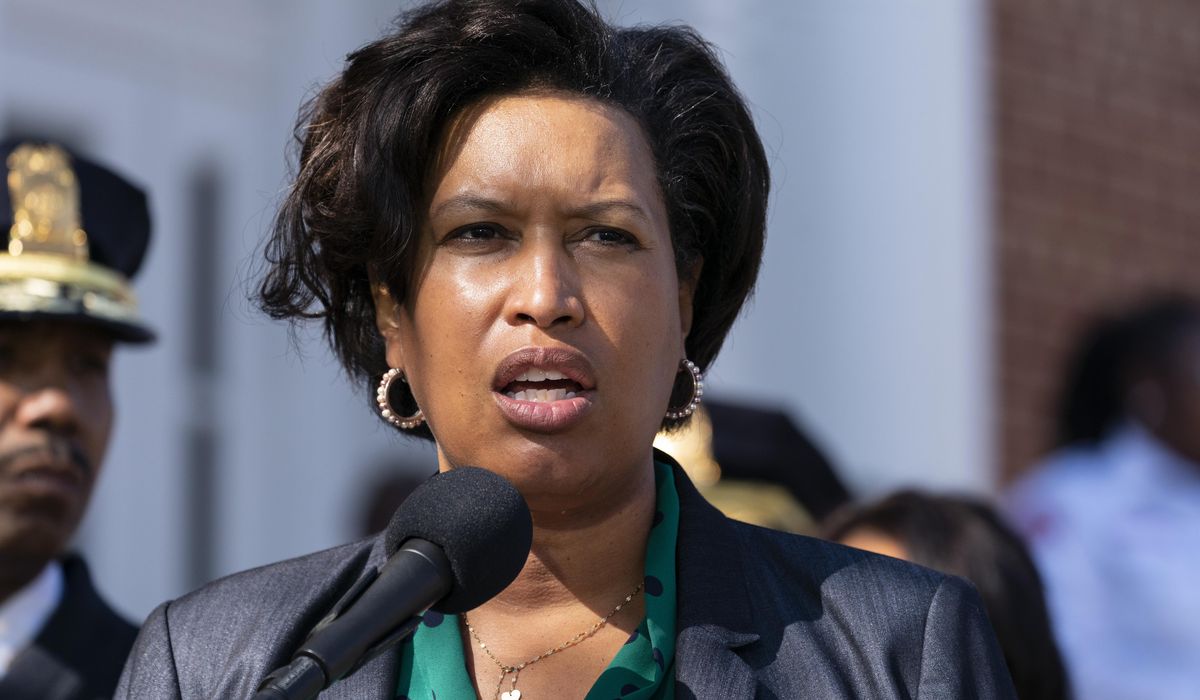Scores of D.C. residents, business owners and neighborhood representatives spoke Wednesday in favor of Mayor Muriel Bowser’s crime-fighting legislation as a yearlong surge in shootings, carjackings and robberies has battered a sense of safety in the nation’s capital.
More than 80 witnesses testified during the D.C. Public Safety Committee’s hearing on the Addressing Crime Trends (ACT) Now bill.
The proposal would relax restrictions on police neck restraint procedures and allow the Metropolitan Police Department to establish drug-free zones for up to five days in ravaged areas.
The bill would also make the leaders of retail theft crews liable for up to 10 years behind bars and allow for felony theft charges against people who steal at least 10 items over 30 days with a total value of $250 or more.
Further, it would create a penalty for those who commit crimes while wearing masks.
As of Wednesday, violent crime had risen 40% over the same period last year. The rise in crime throughout 2023 has been spearheaded by spikes in homicides (up 32%), carjackings (up 107%) and robberies (69%).
Daily reports of shootouts and muggings have fatigued city residents, and the city’s youngest residents aren’t spared.
Jay Brown, who works with local aid organization Community Shoulders, said his daughter is still reeling from her experience inside a car while three armed men stole the vehicle and pointed guns at her and the driver.
“My daughter is 3 years old, and she’s showing symptoms of post-traumatic stress disorder,” Mr. Brown testified. “It’s very hurtful to watch her dive on the floor when a trash truck rumbles past us.”
In the latest embarrassment for the city, a carjacking Wednesday victimized an FBI agent. According to MPD, two people carried out the armed theft midafternoon.
The vehicle was found 30 minutes later about a mile away from the crime site.
A majority of those who testified earnestly shared stories of how crime has affected their lives, particularly the open-air drug markets peppered throughout the city.
Howard Marks, vice president of the Residences at the Gallery Place Condominium Association, talked about how residents and shoppers must pass through a “gauntlet of dealers” who post up by the Friendship Arch in Chinatown.
Lesil Farrakhan, a Ward 7 resident who teaches at the Maya Angelou Public Charter School, talked about how drug deals regularly take place across the street from her home, bringing prostitution and even shootings into the neighborhood.
Ward 5 Advisory Neighborhood Commissioner Kathy Henderson said the proposed establishment of drug-free zones doesn’t go far enough.
She wants business owners to be able to request drug-free zones and said bus stops should be eligible because dealers ride from stop to stop to make sales.
Less-pointed support was voiced for ACT Now’s proposal to rewrite police protocols regarding neck restraints.
D.C. Police Union Chairman Gregg Pemberton testified that the stringent policies have complicated police responses in the field.
He noted that an officer was disciplined for the way he braced a juvenile girl’s head while responding to a mental health call in Ward 8.
Mr. Pemberton said the girl began flinging her head into a wall during the response, prompting the officer to grab the back of her head to prevent her from continuing to hurt herself.
MPD’s internal affairs reviewed the incident and found the officer’s restraining methods violated the department’s use-of-force policy.
The revised neck restraint policy would let officers put a hand on the back of a suspect’s head while prohibiting any choking grip that cuts off oxygen or blood flow to the brain.
Ms. Bowser said when introducing the bill last month that changing the neck restraint policy is intended to help MPD recruitment.
Chief Pamela Smith testified that the department lost a net of 123 officers during fiscal 2023 and is at its lowest staffing levels in half a century.
Those who opposed the proposed change, such as Ruby Yearling from the Civil Rights Corps, testified that it would give officers the license “to act with absolute impunity when interacting with community members.”
Ms. Yearling said the city’s Black residents, who have a disproportionate number of interactions with MPD, would be particularly harmed.
Nee Nee Taylor, executive director of local “abolitionist” organization Harriet’s Wildest Dreams, criticized the bill’s proposal to let officers review their body-camera footage before writing police reports.
“Allowing officers to tailor their statements to video evidence undermines the very purpose of body-worn cameras around objective records of events,” Ms. Taylor said. “This practice raises serious questions about transparency and accountability within law enforcement.”
Some witnesses opposed the legislation simply because it doesn’t address the killings and violent thefts that are driving the city’s crime woes.
Roger Marmet, the founder of Peace for DC, called the ACT Now bill “another example of making things up as we go along.”
Mr. Marmet said there is no evidence to prove that any of the bill’s provisions will reduce violent crime. He mentioned that the National Network for Safe Communities has a “proven” nine-step process for dismantling drug markets, which includes heavy infusions of wraparound social services.
“This is why this legislation — a slew of legislation — thrown at the wall, at the edges, will not make us safer,” Mr. Marmet said.
The District is “an outlier, as you know, among other American cities. Only two other cities have a higher year-on-year increase in homicide and violent crime because what we are doing is not working,” he said.
The committee must approve the ACT Now bill before sending it to the entire D.C. council for review.
𝗖𝗿𝗲𝗱𝗶𝘁𝘀, 𝗖𝗼𝗽𝘆𝗿𝗶𝗴𝗵𝘁 & 𝗖𝗼𝘂𝗿𝘁𝗲𝘀𝘆: www.washingtontimes.com
𝗙𝗼𝗿 𝗮𝗻𝘆 𝗰𝗼𝗺𝗽𝗹𝗮𝗶𝗻𝘁𝘀 𝗿𝗲𝗴𝗮𝗿𝗱𝗶𝗻𝗴 𝗗𝗠𝗖𝗔,
𝗣𝗹𝗲𝗮𝘀𝗲 𝘀𝗲𝗻𝗱 𝘂𝘀 𝗮𝗻 𝗲𝗺𝗮𝗶𝗹 𝗮𝘁 [email protected]



